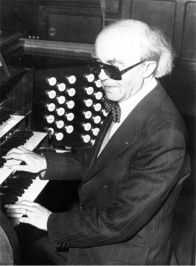Jean Langlais

Jean Langlais (15 February 1907 – 8 May 1991) was a French composer of modern classical music, organist, and improviser.
Biography
Jean Langlais was born in La Fontenelle (Ille-et-Vilaine, Brittany), a small village near Mont Saint-Michel, France. Langlais became blind due to glaucoma when he was only two years old, and was sent to the Institut National des Jeunes Aveugles (National Institute for Blind Children) in Paris, where he began to study the organ, with André Marchal. From there, he progressed to the Paris Conservatoire, obtaining prizes in organ, which he studied with Marcel Dupré, composition, which he studied with Paul Dukas. He also studied improvisation with Charles Tournemire.
After graduating, he returned to the National Institute for Blind Children to teach, and also taught at the Schola Cantorum in Paris from 1961 to 1976. Many of his students went on to become important musicians, including organist and composer Naji Hakim.
However, it was as an organist that Langlais made his name, following in the steps of César Franck and Charles Tournemire as organiste titulaire at the Basilica of Sainte-Clotilde in Paris in 1945, a post in which he remained until 1988. He was much in demand as a concert organist, and toured widely across Europe and the United States.
Outside music, Langlais was a colorful and charismatic character. He died in Paris aged 84, and was survived by his second wife Marie-Louise Jaquet-Langlais and three children, Janine, Claude and Caroline.
Music
Langlais was a prolific composer, composing 254 works with opus numbers, the first of which was his Prelude and Fugue for organ (1927), and the last his Trio (1990), another organ piece. Although best known as a composer of organ music and sacred choral music, he also composed a number of instrumental, orchestral and chamber works and some secular song settings.
Langlais's music is written in a late, free tonal style, representative of mid-twentieth-century French music, with rich and complex harmonies and overlapping modes, more tonal than his contemporary, friend and countryman Olivier Messiaen, but related to his two predecessors at Sainte-Clotilde, César Franck and Charles Tournemire.
His best-known works include his four-part masses, Messe solennelle, and Missa Salve Regina, his Missa in simplicitate for unison voice and organ, and his many organ compositions, including:
- Hymne d'actions de grâces from Three Gregorian Paraphrases
- La nativité and Les rameaux (The Palms)(Poèmes Evangeliques)
- Chant héroïque, Chant de paix, and De profundis from Nine Pieces
- Kyrie "Orbis factor" from Livre œcuménique
- Incantation pour un jour saint (Incantation for Easter)
- Cantilene (Suite brève)
- Suite médiévale
- Folkloric Suite
- Trois méditations sur la Sainte Trinité
- Fête, Op. 51
- 24 Pieces for harmonium or organ, Op. 6
Discography
- DVD, Life and Music of Jean Langlais, 2007, Los Angeles chapter of the American Guild of Organists.
Bibliography
- Jean Langlais: The Man and His Music, by Ann Labounsky, Amadeus Press, 2000. ISBN 1-57467-054-9
- Ombre et Lumière : Jean Langlais 1907-1991, by Marie-Louise Jaquet-Langlais, Paris: Éditions Combre, 1995. ISBN 2-9506073-2-2
References
External links
- Official tribute website (includes full list of works)
- Website of the Association of the Friends of Jean Langlais
- Langlais mp3 files
|